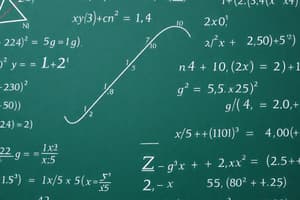Podcast
Questions and Answers
Which trigonometric function is equal to 0.4?
Which trigonometric function is equal to 0.4?
- sin A (correct)
- cosec A
- cos A
- tan A
Without using a calculator, what is the value of $cos(765)$?
Without using a calculator, what is the value of $cos(765)$?
- undefined
- 0
- 1 (correct)
- -1
Without using a calculator, find the value of $x$ if $4^x = 16$
Without using a calculator, find the value of $x$ if $4^x = 16$
- 3
- 4
- 2 (correct)
- 1
Prove that $tan(A + B) = \frac{tan(A) + tan(B)},{1 - tan(A)tan(B)}$
Prove that $tan(A + B) = \frac{tan(A) + tan(B)},{1 - tan(A)tan(B)}$
Study Notes
Trigonometric Functions
- The sine of an angle in a right triangle is equal to the ratio of the opposite side to the hypotenuse.
- The cosine of an angle in a right triangle is equal to the ratio of the adjacent side to the hypotenuse.
Trigonometric Identities
- The cosine of an angle is equal to the cosine of the angle's reference angle.
- The cosine of an angle that is a multiple of 360 degrees is equal to the cosine of the angle's reference angle.
Exponential Functions
- If a is a positive real number and a ≠ 1, then a^x = y is equivalent to loga(y) = x.
- In this case, 4^x = 16 is equivalent to log4(16) = x.
Proofs
- To prove the tangent angle sum identity, tan(A + B) = tan(A) + tan(B) / 1 - tan(A)tan(B), we can use the following steps:
- Start with the formulas for sin(A + B) and cos(A + B)
- Substitute the formulas for sin(A + B) and cos(A + B) into the formula for tan(A + B)
- Simplify the resulting expression to get the desired identity
Studying That Suits You
Use AI to generate personalized quizzes and flashcards to suit your learning preferences.
Description
This quiz tests your trigonometry skills by challenging you to solve various trigonometric equations and prove trigonometric identities. Practice finding the value of sin and cos without using a calculator, as well as solving for unknown variables and evaluating expressions.




